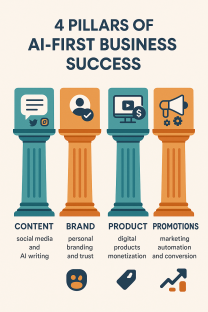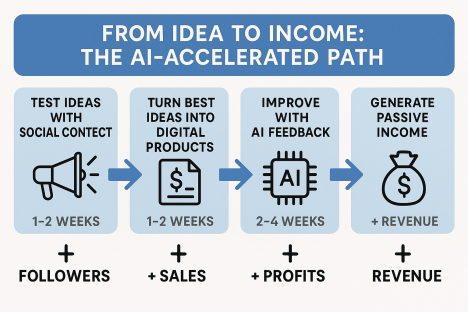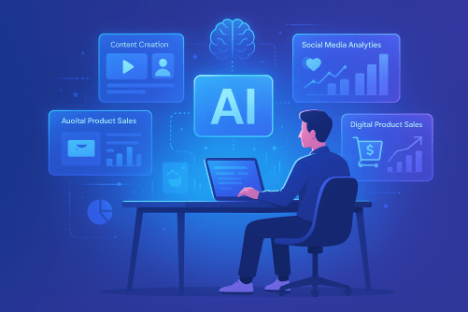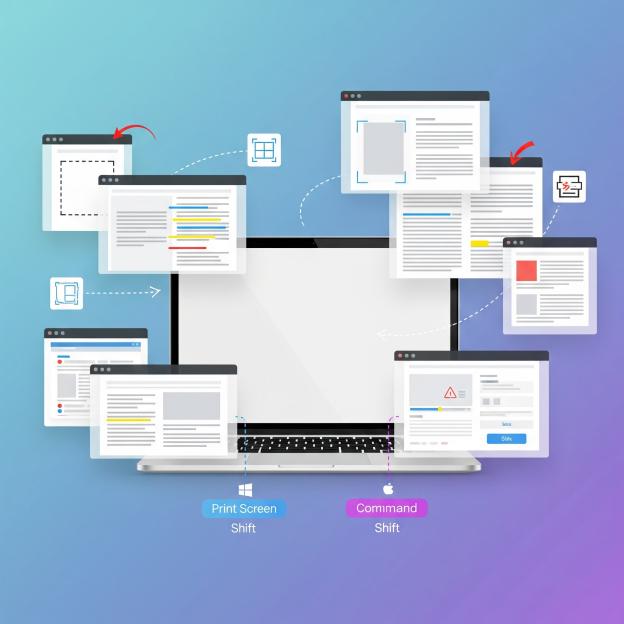The New Path to Wealth Creation â The entrepreneurial landscape has fundamentally shifted. While traditional business models required significant capital, large teams, and years of development, artificial intelligence has created unprecedented opportunities for individual entrepreneurs to build profitable, scalable businesses.
If you want to get rich fast while maintaining control over your time and enjoying meaningful work, building an AI-first one-person media company represents one of the most viable paths forward in 2025.
This comprehensive guide will show you exactly how to leverage AI tools and modern digital strategies to create a profitable business that works for you, not the other way around.
Why AI-First Businesses Are the Future
The Power of Digital Leverage
Modern technology has created shortcutsâor as entrepreneurs prefer to call them, leverage pointsâthat didn’t exist even five years ago:
- Social Media Reach: A single Instagram reel can reach 500,000 people instantly
- AI-Powered Content: Create high-quality content in minutes, not hours
- Digital Product Testing: Validate ideas in weeks with minimal investment
- Automated Marketing: Scale personalized outreach without increasing workload
The Reality Check
However, shortcuts aren’t synonymous with guaranteed success. You still need to:
- Learn how to effectively use AI tools
- Understand fundamental business principles
- Commit to consistent execution
- Accept that failure is part of the learning process
The 4 Wealth-Building Paths (And Why #3 Is Your Best Bet)

- Save monthly income (slow)
- Invest in stocks/real estate (less slow)
- Build a cash flow business (controllable)
- Invest abundance of cash (for the already wealthy)
Option #3âbuilding a cash flow businessâis the most accessible and controllable path for most people. AI simply accelerates this process dramatically.
Essential Principles for AI-First Business Success
1. Every Business Is Now a Media Business
In 2025, every successful business creates content to attract customers. This includes:
- E-commerce brands sharing lifestyle content
- Local businesses posting community updates
- Digital product creators teaching their expertise
- Service providers demonstrating their knowledge
Key Insight: Organic content builds long-term trust and brand recognition, becoming increasingly valuable as AI-generated content floods the internet.
2. Your Personality Is Your Differentiator
Personal branding isn’t about vanityâit’s about economics. People buy from people they trust, and trust becomes scarce when AI creates unlimited content.
You don’t need to:
- Show your face
- Use your real name
- Share personal details
You do need:
- A compelling story
- Consistent personality
- Clear mission to help others
- Authentic voice and perspective
3. Start with Digital Products
Digital products offer the perfect testing ground for AI-first businesses:
Advantages:
- Low startup costs
- Rapid iteration capability
- High profit margins
- Instant global distribution
- Easy to automate delivery
Process:
- Test ideas through social content
- Create MVP digital products quickly
- Gather feedback and improve
- Scale successful products
- Expand into related offerings
4. Master the Four Core Skills
Every AI-first business requires proficiency in:
- Content Creation â Attracting potential customers
- Brand Building â Establishing trust and authority
- Product Development â Creating valuable offerings
- Promotion â Converting audiences to customers
Building Your AI-First One-Person Media Company

Phase 1: Brand Development with AI
Step 1: Research and Learning
Instead of spending months learning personal branding theory, use AI to accelerate the process:
- Find expert content (YouTube videos, books, courses)
- Feed the information into AI for comprehensive breakdown
- Create personalized action plans based on your goals
- Generate an AI coach to guide your implementation
Step 2: AI Prompt Creation
Create a two-phase AI coaching system:
Phase 1 â Context Gathering:
- AI interviews you to understand your goals
- Gathers information about your expertise and interests
- Analyzes your target audience
- Creates personalized strategy
Phase 2 â Implementation Coaching:
- Provides step-by-step action items
- Offers feedback on your progress
- Suggests optimizations and improvements
- Guides you through advanced strategies
Phase 2: Content Strategy with AI
Step 1: Idea Generation
Use your brand strategy to generate 30+ validated content ideas that balance:
- High-performing topics in your niche
- Your audience’s pain points
- Unique perspectives that differentiate you
- Authoritative content that builds trust
Step 2: Structure Analysis
Analyze high-performing content in your niche:
- Identify top-performing posts/videos
- Use AI to break down their structure
- Understand psychological engagement patterns
- Create templates for your own content
Step 3: Content Creation Automation
Develop AI prompts that:
- Generate outlines based on proven structures
- Create scripts following your brand voice
- Optimize content for platform-specific requirements
- Maintain consistency across all content pieces
Phase 3: Product Development with AI
Digital Product Options
- Ebooks: Comprehensive guides on specific topics
- Online Courses: Step-by-step training programs
- Templates: Ready-to-use resources for your audience
- Coaching Programs: Personalized guidance offerings
- Software Tools: Simple apps solving specific problems
AI-Powered Product Creation Process
- Market Research: Use AI to analyze successful products in your niche
- Offer Creation: Apply proven frameworks (like Alex Hormozi’s offer structure)
- Content Development: Break down competitor products and create superior alternatives
- Landing Page Copy: Use AI with proven copywriting frameworks
- Product Structure: Analyze successful course/ebook structures for your own products
Phase 4: Promotion and Marketing with AI
Systematic Promotion Strategy
- Link products in all content descriptions
- Reply to social media posts with valuable insights
- Create story-driven promotional content
- Use platform-specific promotion tactics
AI-Enhanced Copywriting
Leverage proven frameworks like:
- PAS (Problem, Agitation, Solution)
- AIDA (Attention, Interest, Desire, Action)
- Before and After Bridge
Create multiple promotional variations and test performance across different platforms and audiences.
Implementation Timeline
Week 1-2: Foundation Building
- Complete AI brand coaching process
- Set up chosen social media platform
- Create content calendar template
- Begin posting consistently
Week 3-4: Content Optimization
- Analyze initial content performance
- Refine AI content creation prompts
- Build audience engagement strategies
- Start building email list
Week 5-6: Product Development
- Validate product idea through content
- Create minimum viable product
- Develop sales landing page
- Set up payment processing
Week 7-8: Launch and Scale
- Launch product to existing audience
- Implement systematic promotion strategy
- Gather customer feedback
- Plan product improvements and expansions
Tools and Platforms for Success
AI Tools
- Content Creation: ChatGPT, Claude, Gemini
- Video/Audio: Descript, Eleven Labs
- Design: Midjourney, DALL-E
- Analytics: Various platform-specific tools
Business Platforms
- Payment Processing: Stripe
- Email Marketing: ConvertKit, Mailchimp
- Course Hosting: Teachable, Thinkific
- Social Media Management: Buffer, Later
Common Pitfalls and How to Avoid Them
1. Over-Reliance on AI
Problem: Letting AI do everything without human oversight Solution: Use AI as a powerful assistant, not a replacement for your expertise
2. Inconsistent Execution
Problem: Starting strong but failing to maintain momentum Solution: Create systems and schedules that ensure consistency
3. Ignoring Audience Feedback
Problem: Creating products without validating market demand Solution: Always test ideas with your audience before full development
4. Underpricing Products
Problem: Competing on price instead of value Solution: Focus on transformation and results, not features
Measuring Success and Scaling
Key Metrics to Track
- Content Performance: Engagement rates, reach, saves/shares
- Audience Growth: Follower count, email subscribers
- Product Metrics: Conversion rates, customer satisfaction
- Revenue: Monthly recurring revenue, average order value
Scaling Strategies
- Product Line Expansion: Create complementary products
- Premium Offerings: Develop higher-ticket coaching or consulting
- Automation: Implement more AI-powered systems
- Team Building: Hire specialists for specific tasks
- Physical Products: Expand successful digital products into physical realm
Conclusion: Your AI-Powered Future Starts Now
Building an AI-first one-person media company isn’t just about making moneyâit’s about creating a lifestyle business that gives you freedom, flexibility, and fulfillment.
The technology exists today to build something remarkable as a solo entrepreneur. The question isn’t whether it’s possible, but whether you’re willing to commit to the learning process and consistent execution required to make it happen.
Remember: AI amplifies your efforts, but it doesn’t replace the need for strategy, persistence, and genuine value creation. Use these tools wisely, stay focused on serving your audience, and be prepared to adapt as the landscape continues to evolve.
The future belongs to those who embrace AI as a collaborative partner in building meaningful, profitable businesses. Your journey starts with a single piece of content, a single product idea, and a commitment to helping others solve their problems.
Start today. Your AI-powered empire awaits.
Frequently Asked Questions
Q: Do I need technical skills to build an AI-first business? A: No. Most AI tools are designed for non-technical users. Focus on learning the business fundamentals and using AI tools as assistants.
Q: How much money do I need to start? A: You can start with less than $100. Most costs are for tools and platforms, not inventory or equipment.
Q: How long before I see results? A: Expect 90-180 days to build momentum, with first sales possible within 30-60 days of consistent effort.
Q: What if I don’t have expertise in anything? A: Everyone has expertise in something, even if it’s just personal experiences. Start documenting your learning journey in any area you’re passionate about.
Q: Is this sustainable long-term? A: Yes, if you focus on building genuine value and relationships. AI tools will evolve, but the fundamental principles of business and human connection remain constant.







